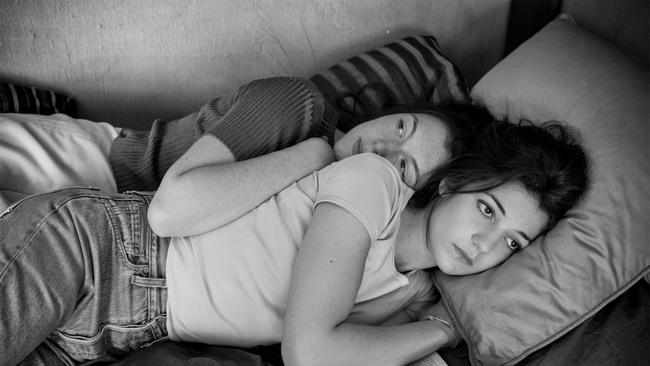Cannes 2017: Philippe Garrel’s Lover for a Day

“Philippe Garrel has always only needed the barest means to make movie magic,” begins Daniel Kasman in the Notebook: “a beautiful, tragic face, a sad wall to put behind it, a mournful, pensive walk alone on the street. He is back in Cannes at the Directors’ Fortnight, having first come in 1969 with Le lit de la vierge, and once again proves he is nearly alone is continuing the French New Wave’s revolution of creating celluloid myths from mere bedrooms and cafes. Lover for a Day, his newest, one of his most simple, is a lithe, splendid picture, dazzling in its clarity, direct emotional resonance and condensed storytelling.”
The Notebook also features a video interview with Garrel, conducted by Daniel Kasman with the help of Kurt Walker (15’53”).
“Lover for a Day is the closing part of a trilogy that also consists of Jealousy (2013) and In the Shadow of Women (2015), with all three clocking in at under 80 minutes and shot, in grainy black-and-white, in just 21 days,” writes the Hollywood Reporter’s Boyd van Hoeij. “Each story explores love and its adjacent emotions, such as jealousy, lust and fidelity, often while focusing on its female leads. Though not as strong as the other two titles in the trilogy, this story of a fiftyish educator, who falls for one of his students who happens to be as old as his daughter, is nonetheless a frequently fascinating minor Garrel.”
“Instead of casting his son Louis Garrel, who either starred in or narrated his father’s previous five features, the director has gone with his daughter, Esther Garrel (of the Sundance sensation Call Me by Your Name).” Ben Croll for IndieWire: “She stars as Jeanne, a young student experiencing her first pangs of heartbreak. Kicked out by her now ex and with nowhere to go, Jeanne ends up moving in with her father, university professor Gilles (Eric Caravaca). But there’s another young woman in the picture, Gilles’s student Ariane (Louise Chevillote), who’s been living with her professor-boyfriend for the past three months. The always-understated director never mines the domestic situation for excessive melodrama, instead opting to step back and wryly examine the three leads’ contradictory impulses.”
“With the help of an instructive narration, the film moves stealthily though a short block of time and leaves no embarrassing detail un-dredged,” writes David Jenkins at Little White Lies. “Information is gathered and used as a bargaining chip between allies, but the film never really moves into the terrain of theatrical backstabbing and double-crossing. It’s careful and poised cinema that hangs on every precious syllable. It’s ideas are deeply rooted within words and faces, there for the taking but never just handing over anything unbidden.”
“Cinematographer Renato Berta’s luminous black-and-white lensing gives the film a timeless patina, reinforced by the characters’ smart, sober and very Parisian wardrobe, and though all three actors are impeccable, newcomer Louise Chevillotte captivates the most,” writes Pamela Pianezza for Variety. “The film benefits from the collective contributions of four screenwriters—Garrel, of course; young writer-director Caroline Deruas (L’Indomptée); Pialat’s former partner Arlette Langmann (A nos amours); and Buñuel’s ex-companion-in-arms Jean-Claude Carrière (Le Charme discret de la bourgeoisie)—whose collective insights result in a beautiful complexity.”
“Garrel has said the film is in part his reflection on Freud’s Elektra complex, and that the story reflects on woman’s subconscious desires,” notes Ed Frankl at the Film Stage. “That’s perhaps not much more than a dose of overwrought French intellectualism, but it’s true that Garrel’s brilliantly-cast characters are perturbed by inner demons that inevitably pull them apart.”
“Garrel questions a multitude of themes about our affective lives . . . without ever passing even an ounce of judgement, doing it simply to reflect the subtle inflections of life and the eternal cycle of desire and love,” writes Fabien Lemercier at Cineuropa.
“While not quite as lilting and affecting as 2015’s In the Shadow of Women, this Directors Fortnight premiere knows what it’s doing and does it well,” finds Lisa Nesselson in Screen.
More in Spanish from Diego Lerer and in French from Olivier Père.
Update, 5/30: “MUBI has acquired all rights to the U.S., U.K. and Ireland,” reports Variety’s John Hopewell.
Updates, 7/4:Kent Jones: “It’s been a rewarding experience to see Garrel’s cinema as it has changed over the years, incorporating and absorbing different longings and personalities and strategies (from the coming and going of writer Marc Cholodenko and DP Raoul Coutard to the gradual disappearance of Nico as an inspiration), and yet stayed absolutely and gloriously itself.”
Also in Film Comment,Amy Taubin: “The story is quotidian, but the performances have a low-key psychological charge, and the images—exquisitely shadowed black-and-white 35mm— give the narrative a timelessness that is precisely the point of Garrel’s enterprise.”
Cannes 2017 Index. For news and items of interest throughout the day, every day, follow @CriterionDaily.



